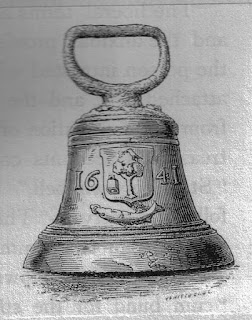James
Rowe had expressed his feelings about his faith in other songs, but as he thought
about the life he’d led, he must have thought he needed to say something more
directly to those he called his spiritual family. “Ring Out the Message”, this
40-something Irishman exhorted. Don’t keep this news to yourself, he declared
in 1911, even as you meet other nationalities or travel abroad. Get the attention
of those within earshot with something like a ringing bell (like this one from
Scotland, near Rowe’s native country). Indeed, was he thinking about his
homeland, even after two decades of life thousands of miles from there? He’d
jumped more than once between professional directions in the previous two-plus
decades, and that must have painted his outlook in some way, too. Maybe he saw
more clearly what was really meaningful, something worth underscoring for himself
and others as he thought about how to spend the next phase of his life. What is
paramount?
James
Rowe had been through his share of life changes by the time his 46th
year rolled around and he penned the words of “Ring Out the Message” (also known
as “There’s a Message True and Glad”, the poem’s first line). From working for
Ireland’s government, to travelling to America to work in the railroad industry
in New York, and then switching gears once more to become an inspector in the
Humane Society in his adopted state and country, Rowe had not been beholden to
any particular vocational calling by the time he wrote “Ring Out..”. But he
must have written plenty of lyrics for hymns by this time -- over 2,600 are credited
to him over his prolific life – that proclaimed where his true allegiance lay. It’s
said that James eventually worked (sometimes using the pseudonym James S. Apple)
for music publishing companies in Tennessee and Texas, an indication that he ultimately
did put more stock into his faith’s musical calling professionally. It’s not
known what compelled Rowe especially to ‘ring out’ the Christian message in
1911, but it wouldn’t be surprising if his life’s changes had brought to light
more clearly faith’s importance – its firm hold – for him. Did others around
him not have this anchor, unlike himself? Were there people he still knew in
Ireland to whom he called out--‘o’er land and sea’ (song’s refrain)? Or, maybe
he knew ‘needy ones’ (verse 2) where he lived who needed the ‘true and glad’
news (verse 1). Who doesn’t?
James
Rowe really thought the ringing ought to be a happy sound, didn’t he? That
presumption directs those of us who know the news where to look. Who needs a boost?
James already tells us…sad (verse 1), needy, even destitute (verse 2) beings, and
yes, those who sense the guilt of their wrongdoing too (verses 1 and 3). It’s shouldn’t
be hard to find the dejected, though sometimes they’re well-insulated, maybe
distracted. Hey, maybe if I shouted and laughed out loud more often, they’d
wanna see what is so much fun! I have a co-worker whose college football tradition
is to ring a cowbell really loud when his team scores. (I think it’s a
Mississippi thing). Maybe that’s the mental approach…turn on the news channel,
and leave it on as if it’s your most thrilling football game. Ring that bell a
little louder.
See
following for brief biographies of composer:


No comments:
Post a Comment